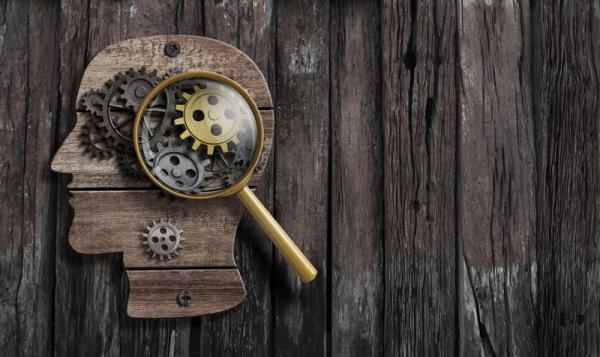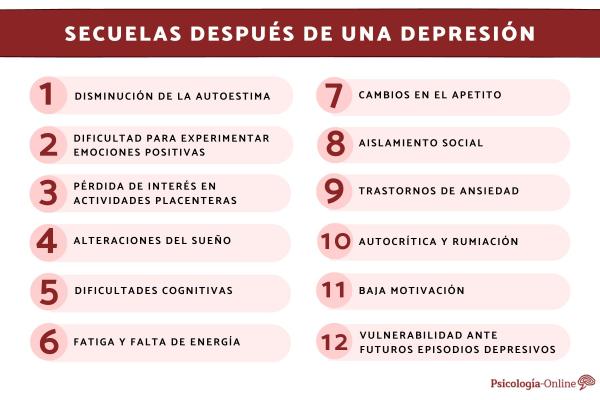Depression is a mental illness that affects millions of people around the world. It is often described as a deep feeling of sadness and hopelessness, but its consequences go beyond emotional symptoms. The after-effects of depression can last even after the main symptoms have subsided, and understanding these after-effects is essential for a complete recovery.
In this PsychologyFor article we will explain the twelve most common consequences that depression can leave we will talk about whether depression can leave after-effects on the brain based on current research and we will provide the keys to treating the after-effects after depression.
What consequences can depression leave?
The after-effects after depression can vary from person to person, but below are 12 common after-effects that may be experienced:
- d decreased self-esteem: Depression can negatively affect self-perception, generating feelings of worthlessness, guilt, and low self-esteem and self-confidence.
- Difficulty experiencing positive emotions: After depression, some people may have difficulty experiencing positive emotions, which may result in a decreased interest and ability to enjoy pleasurable activities.
- Loss of interest in previously enjoyed activities: Depression can lead to a loss of interest in activities that were previously pleasurable, known as anhedonia. This sequelae may persist even after depressive symptoms have subsided.
- Sleep disturbances: Depression can disrupt your sleep pattern, causing insomnia or hypersomnia. After depression, some people may continue to experience difficulty falling asleep or staying asleep adequately.
- Cognitive difficulties: Depression can affect cognition, including problems concentrating, difficulties making decisions, decreased memory, and difficulties in problem solving.
- Fatigue and lack of energy: Many people experience fatigue and a general feeling of lack of energy after depression. This can affect your ability to carry out daily activities effectively.
- Changes in appetite: Depression can alter appetite, resulting in a significant decrease or increase in food intake. After depression, some people may continue to deal with changes in appetite and relationship with food.
- Social isolation: During depression, it is common for people to isolate themselves socially. However, even after recovery, some people may have difficulty reintegrating socially and may experience social anxiety or fear of rejection.
- Anxiety disorders: Depression and anxiety disorders often occur together. After depression, some people may develop anxiety disorders, such as panic disorder, generalized anxiety disorder, or post-traumatic stress disorder.
- Self-criticism and rumination: Depression can increase levels of self-criticism and rumination, which involves recurring negative thoughts and constant self-criticism. These thinking patterns may persist after recovery from depression.
- Low motivation: Lack of motivation is a common after-effect after depression. People may experience difficulty finding meaning or purpose in daily activities, which can affect their productivity and overall satisfaction.
- Vulnerability to future depressive episodes: After an episode of depression, there is an increased risk of experiencing recurrent episodes in the future. This vulnerability may be due to biological, genetic, environmental and psychological factors, and it is important to take preventive measures and seek appropriate support to reduce this risk.
Does depression leave consequences on the brain?
Scientific research has shown that depression can leave consequences on the brain, Like the memory problems, cognitive difficulties and the vulnerability to future episodes depressives. In this sense, through various neuroimaging techniques, structural and functional changes have been identified in the brain of people who have experienced depression.
Regarding structural changes, it has also been observed that depression may be associated with a decreased volume of certain brain regions , such as the hippocampus, prefrontal cortex and amygdala. These areas play a crucial role in emotional regulation, memory and decision making, so their alteration may contribute to depressive symptoms and the sequelae that persist after depression.
On the other hand, evidence has been found of changes in brain functional connectivity in people who have suffered depression, as well as alterations in brain networks related to emotional regulation, attention and self-reference in individuals with a history of depression. However, the brain has the ability to adapt and change over time, which means that It is possible to reverse some of these changes and promote recovery.
Remember that not everyone who experiences depression will necessarily experience these changes, and the way they develop and relate to individual after-effects may vary. In any case, further research is needed to better understand the underlying mechanisms and develop more effective treatment approaches to address the brain sequelae of depression.

How to treat the after-effects after depression
Treating the aftermath of depression is an important process to promote complete recovery and improve quality of life. Here are some strategies and approaches that may be helpful:
- Psychological therapy: Psychological therapy, such as cognitive behavioral therapy (CBT), may be beneficial in addressing the after-effects after depression. CBT can help identify and change negative thought patterns, develop healthy coping skills, and foster positive emotional adjustment.
- Supportive therapy: Engaging in supportive therapy, whether individual or group, can provide a safe space to share experiences and emotions related to the after-effects of depression. This can provide emotional support, encourage acceptance and understanding, and promote the healing process.
- Medication: In some cases, the use of antidepressant medications may be recommended by a mental health professional. Antidepressants can help balance neurotransmitters in the brain and relieve persistent or recurring symptoms.
- Establish healthy routines: Adopting healthy lifestyle habits can be beneficial in addressing the after-effects after depression. This includes maintaining a balanced diet, exercising regularly, getting enough sleep, and avoiding excessive consumption of substances such as alcohol or tobacco.
- Practice stress management techniques: Learning and practicing stress management techniques, such as meditation, deep breathing, or yoga, can help reduce anxiety, improve coping skills, and promote emotional well-being.
- Establish a support network: Maintaining healthy and close social relationships can be essential to overcoming the consequences of depression. Seeking support from friends, family, or support groups can provide a sense of belonging, understanding, and emotional strength.
- Self-care: Prioritizing self-care is essential for recovery. This means dedicating time to activities that provide pleasure, relaxation and personal well-being, such as hobbies, reading, music, art or any other activity that is rewarding.

This article is merely informative, at PsychologyFor we do not have the power to make a diagnosis or recommend a treatment. We invite you to go to a psychologist to treat your particular case.
If you want to read more articles similar to Aftermath after depression we recommend that you enter our Clinical Psychology category.
Bibliography
- Carceller, M. (2019). Brain alterations in major depression as predictors of the course of the disease. Autonomous University of Barcelona.
- Ledo-Varela, MT, Giménez-Amaya, JM, and Llamas, A. (2007). The human amygdaloid complex and its involvement in psychiatric disorders. Annals of the Navarra Health System. https://scielo.isciii.es/scielo.php?script=sci_arttext&pid=S1137-66272007000100007
- Marrero Alano, MN (2022). Efficacy of Mindfulness-based Cognitive Therapy for the treatment of depression and rumination: a literature review. https://hdl.handle.net/20.500.12008/32875









